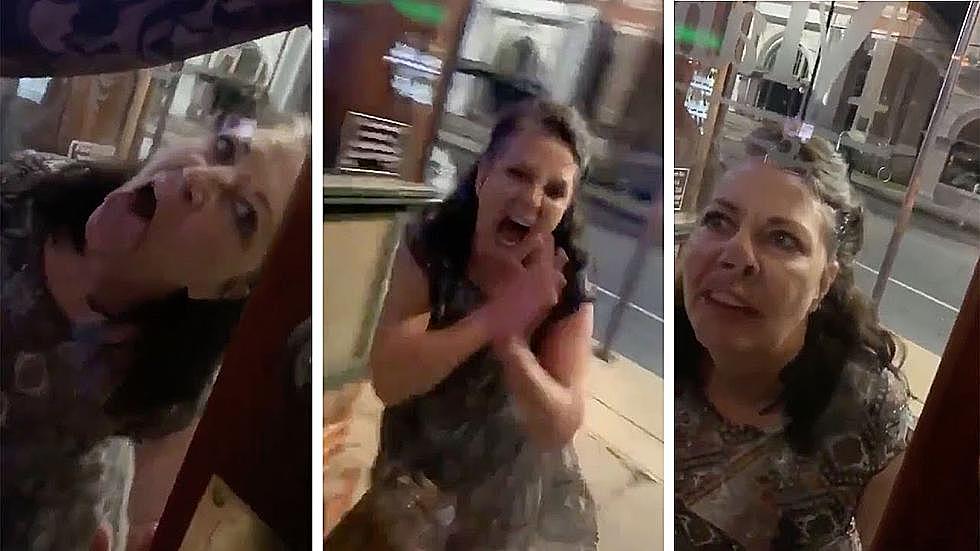Karens
“Zombie Karen” Chronicles: Viral Of Chaos

‘Zombie Karen’ And Her Outlandish Antics
Louisiana lady became the undisputed ‘Zombie Karen.’ Twitter user @sreed101 captured the unusual incident outside Mahony’s pub in Houma on July 2. She was known as ‘Zombie Karen’ because of her similarity to a post-apocalyptic movie figure; this adult woman’s actions exceeded 2020’s high standards.
— Explict Behaviors (@sreed101) July 2, 2020
In a 2-minute-20-second film, ‘Zombie Karen’ tries to smash the bar’s glass door, unaware that her attempts are fruitless and funny. She is seen licking the bar window and cursing at a Black guy who was filming. Her incident was compared to ‘I Am Legend,’ making her the year’s most memorable Karen.
Psychological Rollercoaster And Racist Rhetoric
The video shows ‘Zombie Karen’ trying to smash through the glass door, causing astonishment and laughs. She menacingly queries spectators’ laughing through the door she just licked. As she uses racist insults, the ludicrous event becomes even more distressing.
She used the N-word, according to netizens, proving her quirkiness. The lady continuously hits her head against the glass, causing self-injury. She extends a middle finger to the bar door despite suspected head trauma, encapsulating the oddity.
Aftermath: Handcuffs, Bite Tries, And Public Reactions
The video ends with cops handcuffing ‘Zombie Karen’; her weird adventure closes. Twitter user @TannerKali_, who claimed to have seen the incident, said the lady was dangerous and tried to bite bar patrons. The border between viral amusement and danger seemed thin.
Some online believed that the lady may have mental health concerns. However, Twitter user @enclave2020 removed empathy after hearing her utter racist insults. The episode, extensively posted on social media, drew worry and laughter. As people altered the video to incorporate moments from ‘I Am Legend,’ this odd meeting with the next Karen saga character became more humorous.
Read Also: Central Park Karen: A Deep Dive Into Consequences, Complexity, And Redemption
Memes, Edits, And Karen Culture On Social Media
After ‘Zombie Karen’s’ shocking exhibition, social media was flooded with memes, edits, and conversations, cementing her position in Karen culture. The internet, known for viralizing oddities, adopted ‘Zombie Karen’ as its next creative inspiration.
Twitter was packed with jokes about the situation. Users couldn’t resist splicing ‘I Am Legend’ clips with ‘Zombie Karen’s’ bar break-in attempts, producing a strange juxtaposition with viewers laughing and shaking their heads. The internet can make even the most ludicrous events funny, as seen in the video modifications and subtitles.
‘Zombie Karen’ raised awareness of the Karen phenomena beyond its hilarity. Users shared their Karen experiences to lament and joke over their frequently crazy actions. The event highlighted the strange social dynamics when entitled people approach the public on video and post them online.
Mental Health Speculations: Compassion In Chaos
As the video of ‘Zombie Karen’ surfaced, numerous netizens questioned her mental health, stating her erratic conduct may indicate underlying concerns. Twitter user @bluefox198107 observed, “People inside laugh and videotape her looking mentally sick.” This position sparked a sophisticated internet discussion about treating similar occurrences with sensitivity and compassion.
Despite the internet’s tendency to sensationalize and ridicule, several advised caution. Mental health activists warned against stigmatizing people based on isolated events and recognizing the complexity of mental health issues. The experience reminded us of the delicate balance between humor and worry when seeing someone in misery.
Karenitis Contagion: On Entitlement And Public Conduct
The ‘Zombie Karen’ episode raised questions about entitlement and public conduct. Some online users said the episode showed increasing entitled behavior in public settings. Many Twitter users agree with @enclave2020: “I nearly worried till she uttered the N-word. After she stated that, my pity and empathy vanished.”
The episode raised questions about the social circumstances that created Karens and the risks of entitled conduct. Some believe tackling entitlement and privilege is essential to creating a more courteous and inclusive public realm. ‘Zombie Karen’ became a symbol of cultural phenomena that raises questions about social standards and how viral occurrences shape public conversation.
Risky Public Outbursts: Intervention And Consequences
The ‘Zombie Karen’ event began as a weird sight but required assistance. The video ended with two police officers handcuffing her, signaling that her behavior had become hazardous. Twitter user @TannerKali_, who claimed to have seen the chaos, said ‘Zombie Karen’ was trying to self-harm and biting bar patrons.
The need for police participation raises questions about the difference between seeing a humorous viral moment and identifying a danger. As the event shows, law enforcement struggles to handle unexpected and volatile public conduct. While viral Karen videos may delight the internet, public safety is a priority.
Chronicles Of Karen: A Reflection On Its Evolution
The ‘Zombie Karen’ event adds to Karen’s story and shows how this online phenomenon develops. From ‘Costco Karen’ to ‘Permit Karen’ and now ‘Zombie Karen,’ each case illustrates entitled behavior’s eccentricities and extremities. These episodes went viral on social media, highlighting how online groups shape and perpetuate cultural trends.
‘Zombie Karen’s’ induction into the Karen Hall of Fame raises questions about how these occurrences shape society. ‘Karen’ has become a cultural colloquialism denoting entitled and belligerent conduct. Karen’s dialog continues on social media as people share their thoughts, feelings, and perspectives on these viral encounters. The phenomena reflect society’s standards, prompting us to discuss entitlement, privilege, and public conduct.












You must be logged in to post a comment Login